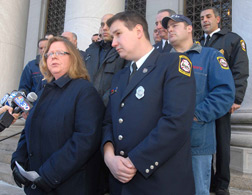The Ladder
This week or next, the Supreme Court will decide the year's big case about race and opportunity. The case, concerning the hiring practices of New Haven, Conn.'s firefighters, is of national interest for two reasons. The first is that it's likely to play a prominent role in Judge Sonia Sotomayor's confirmation hearings later this summer. (Sotomayor ruled on the case when it was before the 2nd Circuit Court of Appeals.) The second is that New Haven's hiring dilemmas are also vexing cities throughout the United States as they try to find ways of hiring and promoting city employees that are both fair and legal. The ruling in Ricci v. DeStefano could affect how cities all over the country decide who gets good jobs in everything from fire departments to police work to trash collection. If the court really goes far, the decision could even affect private employers.
Frank Ricci is part of a group of 20 firefighters—19 of them white and one Hispanic—who are challenging in court New Haven's decision to throw out the results of a 2003 exam for 15 captain and lieutenant promotions. The test results would have given 13 of the promotions to white candidates, perhaps two to Hispanics, and none to African-Americans; because of that racial imbalance, the city withdrew the test. The Ricci plaintiffs said that amounted to denying them the promotions because they are white.
The story behind Ricci is just one example of an entrenched conflict over municipal hiring that extends back in time and across the country. For at least two generations, competition for jobs in many cities has been framed as a battle between one ethnic or racial group and another over who is an insider and who is an outsider. Black firefighters first brought a suit over discrimination in New Haven in 1973. They won. So did minority firefighters who sued Cleveland, Birmingham, St. Louis, New York City, Newark, Bridgeport, Buffalo, Philadelphia, Massachusetts (statewide), San Francisco, Baltimore, and Minneapolis, according to the NAACP Legal Defense Fund.
But those victories all came in the 1970s. More recently, white firefighters have begun to fight back in court. Frank Ricci's case isn't the first reverse discrimination suit in a fire department. In 2001, four white men sued the Boston Fire Department for hiring minority candidates who had scored lower than the plaintiffs on a civil-service exam. They were the first to challenge the Boston department's affirmative-action policy since it had been upheld by the U.S. Supreme Court in 1989. In 2004, they won. Last year, a Los Angeles jury awarded two white fire captains $1.6 million in damages in a suit claiming that they had been punished more severely than a minority officer for participating in the same prank. The New Haven suit, meanwhile, has spurred a similar one by white firefighters, also over promotional exams and test scores, in nearby Bridgeport, Conn.
At the same time, African-Americans are still suing over denied opportunity. Nationally, only 8.2 percent of firefighters and 5.8 percent of supervisors are black, according to 2008 numbers from the Bureau of Labor Statistics. In 1993, the NAACP sued the town of East Haven, Conn., across the river from New Haven, for discriminatory hiring. (As of 1996, the town had never hired a black police or fire department employee.) In New Jersey in 2006, two black fire officers from Camden won a suit that included evidence that African-American firefighters were abandoned by white ones at the scene of a fire, that beds in the firehouse were divvied up by race, and that a white fire chief had told one of the plaintiffs, "I am better than any 10 of you fucking black guys." A federal appeals court the same year found Cleveland liable for putting most of its African-American firefighters in one battalion, which became known as "Monkey Island."
What is it like to work in a fire department divided by a lawsuit over race discrimination? Does the fight matter only to the litigants, or does it spill over and affect the way other black, Hispanic, and white firefighters see and treat each other? Because New Haven's intractable problems are about to make law for the country, we spent the last few weeks reporting on race relations in the New Haven department. The mood wasn't exactly grim. Much of firefighters' time on duty—they work 14-hour shifts—is spent rather domestically. They cook and clean and pass the time between calls. We caught lighthearted moments among firefighters of different races who share the same shift and so get to know one another well. But outside those small groups, we also saw social lines that are also racial. As one black firefighter said to us, "When you sit down and eat lunch, you usually sit with your own, eat with your own."
Maybe that doesn't much matter, as long as you know your co-workers have your back when you're out on the job. As black, white, and Hispanic firefighters in New Haven brace for the Supreme Court's decision, they're keeping their heads down and doing their jobs. But they're also tired and apprehensive. Almost no matter what the court decides, the ruling will mean more hard feelings and strife. No one we talked to can really imagine a way to resolve fairly who will get the promotions—which have been frozen now for six years. In this city at this moment, it's hard to imagine what fair would possibly look like.
Click here to read Part 2: How race affects the work of New Haven's black, white, and Hispanic firefighters.
